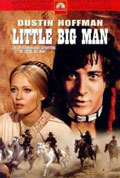
Directed by
Arthur Penn
150 minutes
Rated M
Reviewed by
Bernard Hemingway

Little Big Man
The merits of Little Big Man lie in Thomas Berger’s original text, not director Arthur Penn and screenwriter Calder Willingham’s adaptation of it. Fortunately enough of Berger’s debunking of the Western mythos, something very much of its time, remains, despite Willingham’s tampering with it, condensing and embellishing the sprawling story and Penn’s big budget, crowd-pleasing screen transposition.Dustin Hoffman plays Jack Crabb aka Little Big Man, a 121 year old nursing home inmate who tells the story of how he was as a Cheyenne and eventually became the sole white survivor of Custer's Last Stand. The film starts brilliantly with a heavily made-up Hoffman doing a superb job as the old man. Accepting him as a white settler on the days of the Wild West is a different matter, which is not to say that he’s not very good, it’s just very hard not to see Benjamin Braddock, Hoffman’s iconic character in The Graduate, in fancy dress. Admittedly however this ersatz quality is typical of the film as a whole
Berger’s story is told as a first person narrative and its effectiveness lies very much in Jack Crabb’s unique voice. Hoffman gets this right but the problem is that when the narration stops and we go to direct action, Penn loses hold of Crabb’s drily ironic perspective and we end up with straightfoward comedy. Not all the time, Chief Dan George is convincing as Old Lodge Skins, as is Richard Mulligan as Gen. George Armstrong Custer, but this is entirely because the film stays close to the book with these characters. When it varies, too often Little Big Man looks like a slightly better version of Mel Brooks’s 1974 Western comedy, Blazing Saddles.
Perhaps if you haven’t read Berger’s novel then this may appear more successful. If you haven’t do yourself a favour and you’ll see what I mean.
Want something different?





